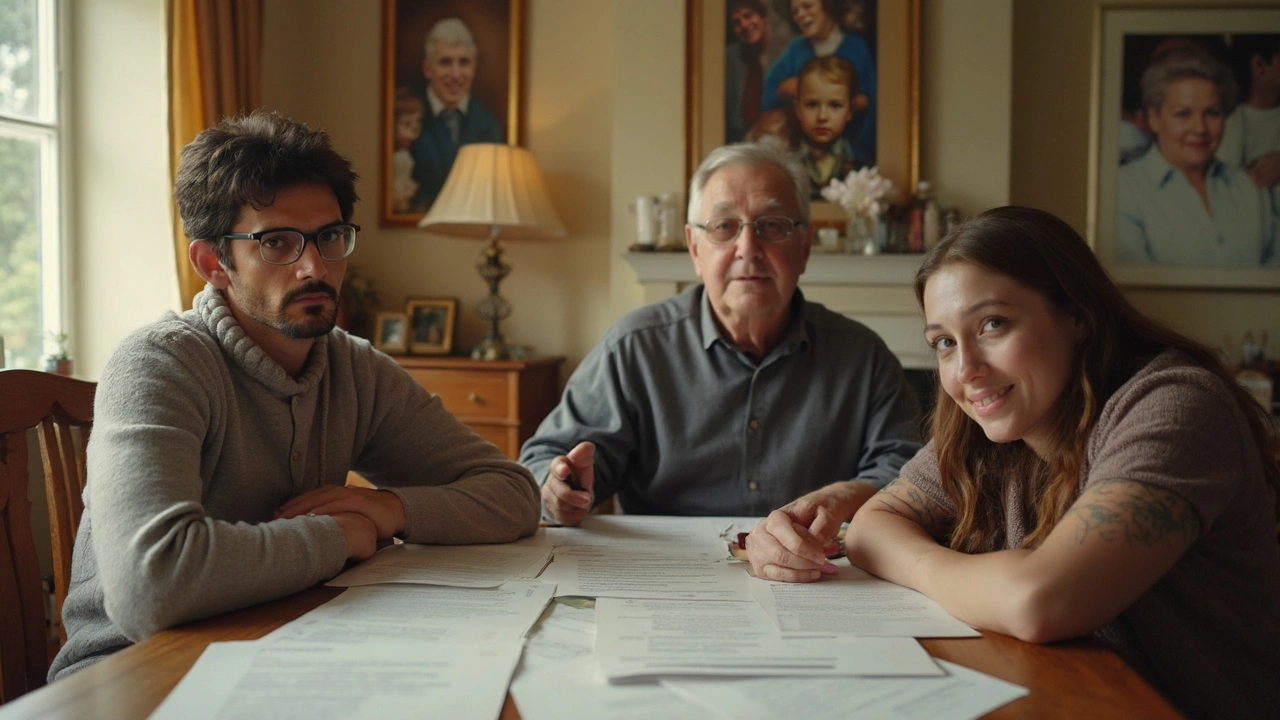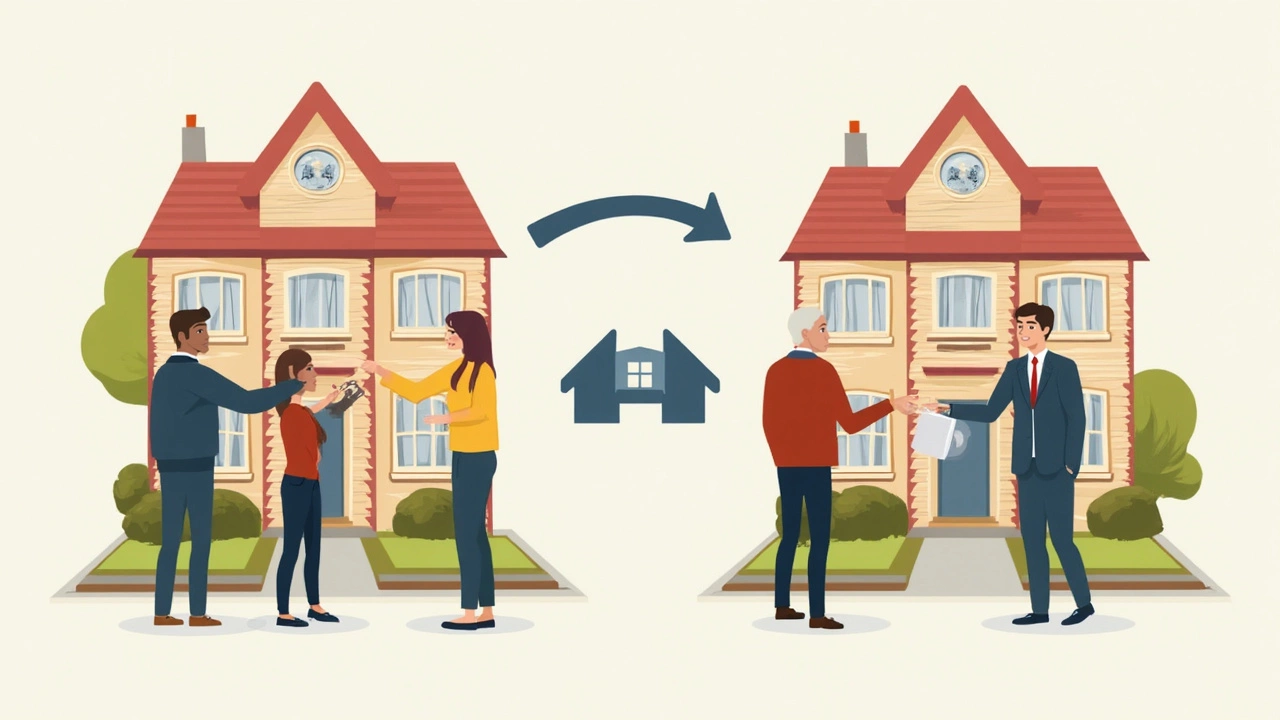What Happens to Jointly Owned Shares on Death? A Real Guide for Shared Ownership Homes
 May, 1 2025
May, 1 2025
If you co-own a shared ownership home, you're probably wondering what happens to your share if something goes wrong—say, if one owner dies. It's not just a paperwork headache; it affects real people and real homes. Knowing the rules now can prevent a ton of stress and arguments later.
Here’s the thing: you have to consider how the shares are held. Are you ‘joint tenants’ or ‘tenants in common’? It sounds legalistic, but it’s actually a big deal because it decides who gets what after a co-owner dies. Mistakes and confusion around this stuff can hold up sales, freeze accounts, or leave families in limbo for months. Most of us only think about these questions when it’s already too late and someone’s passed away.
This guide is for anyone tangled in shared ownership—maybe you bought with a partner, a friend, or even a sibling. It spells out what happens next, who needs to step in, and what paperwork lands on your kitchen table. We’ll look at the difference between the ownership types and easy steps you can take now to keep things as smooth as possible when life throws a curveball.
- Different Ways People Share Ownership
- What Actually Happens When Someone Dies
- Tips to Make Things Smoother
- Mistakes to Watch Out For
Different Ways People Share Ownership
The way you and someone else own your shared place makes a big difference when one of you passes away. There are two main options for jointly owned shares in homes: Joint Tenancy and Tenancy in Common. They sound similar, but the rules around death are actually pretty different.
Joint Tenancy means everyone owns the whole thing together. If one owner passes away, their share automatically goes to the other owner(s)—no will, no probate. The legal term is “right of survivorship.” It’s fast and clean, and is super common for married couples who want everything to go straight to the surviving spouse.
- If you’re joint tenants, the home won’t be part of the deceased’s estate. The other joint owner just gets it, no fuss.
- It doesn’t matter what the will says—the ‘right of survivorship’ trumps whatever is written there.
- This is the default choice if you don’t say otherwise when you buy together, though it’s always smart to double check your paperwork.
Tenancy in Common is more like each person owning their own slice. You’re both on the deeds, but your share doesn’t just pass automatically if you die. Instead, your share becomes part of your estate. Whoever gets your stuff in your will (or by the rules if there’s no will) will inherit your share.
- This is common when friends or siblings buy together, or if you want to leave your part of the shared ownership home to someone other than your co-owner.
- You can own equal or different shares—maybe one of you put in more cash up front, that’s fine.
- The surviving owner doesn’t automatically get the other person’s share—they might end up co-owning with whoever inherited it.
| Type | What Happens on Death? | Can Shares Be Different Sizes? | Goes by Will? |
|---|---|---|---|
| Joint Tenancy | Share passes to survivor | No, always equal | No, will doesn’t matter |
| Tenancy in Common | Share goes to your estate | Yes, any split works | Yes, follows the will |
People sometimes forget, but the choice you make when you buy the home can affect family, partners, and even future buyers. If you haven’t checked your paperwork lately, it’s worth digging it out. This isn’t one of those details you want to ignore until you have to deal with it in a crisis.
What Actually Happens When Someone Dies
When a co-owner of a shared ownership home passes away, the big question is how the ownership gets handled. What happens next depends totally on whether you own as joint tenants or tenants in common. Let's break it down.
If you’re joint tenants, everything is simple and automatic. The surviving owner gets the whole property share without any legal battles, no matter what the will says. This “right of survivorship” kicks in right away. You just need to show the death certificate to the housing association or land registry to update the records.
If you’re tenants in common, things work differently. Each co-owner’s share of the property is considered separate. That means if one dies, their share goes either to whoever's named in their will, or to their next of kin if there’s no will. This is called “passing by will or intestacy.” The process takes longer because you might need a grant of probate before you can sell or transfer the share.
| Ownership Type | What Happens On Death? |
|---|---|
| Joint Tenants | Survivor gets full rights automatically |
| Tenants in Common | Deceased’s share passes by will or to family |
Once you let the housing association, mortgage provider, and land registry know about the death, they’ll give you a to-do list. Usually, you’ll need to hand over documents like the death certificate, the property title, and (if it’s not joint tenants) the will and probate paperwork.
Quick tip: Money tied to the deceased’s share can be held up for months if there's no will or the paperwork isn’t right. Even with a will, probate can take three to six months on average, and sometimes even longer if there are disputes in the family.
So, don’t wait. As soon as the death happens, let the relevant parties know. This cuts down delays and stops extra costs or legal trouble from piling up on top of an already stressful time.

Tips to Make Things Smoother
If you share a home with someone, you don’t want confusion or arguments if one of you passes away. A bit of planning now can save a world of mess, delays, and stress later. Here’s how you can make sure your jointly owned shares in a shared ownership property are handled the way you want.
- Check how you own your home. Make sure you know whether you’re “joint tenants” or “tenants in common.” You can check this on the property’s title deeds or Land Registry records. If you’re not sure, ask your solicitor or call the HM Land Registry.
- Update your will. If you’re a “tenant in common,” your share doesn’t automatically go to the co-owner. Having a will that’s up to date means your wishes are respected and things move along faster if you die.
- Tell your lender and housing association. If you bought your house through a shared ownership scheme, your lender and housing association should know who the owners are. Keeping them in the loop stops delays when shares change hands.
- Get life insurance. If one person suddenly passes, a life insurance payout can help the survivor buy out your share or cover the mortgage. This is especially important if you’re both counting on each other’s income.
- Plan for inheritance tax. If you’re not married or civil partners, inheritance tax could hit your loved ones harder. Planning with a financial adviser can help you avoid nasty surprises.
- Consider a deed of trust. If you’re investing different amounts or want to spell out exactly what happens to your jointly owned shares, setting up a deed of trust puts everything in black and white.
Just to give you a real sense of risk: In a 2023 UK survey, nearly 40% of people in shared ownership had never checked or updated their wills, and half had no idea what would actually happen to their share if they were to die. That’s a huge chunk of homes heading for unnecessary legal headaches.
So, bottom line—talk to a solicitor, have awkward chats with your co-owner, and get your paperwork sorted. Action now means less drama later for everyone involved in your shared ownership journey.
Mistakes to Watch Out For
When it comes to jointly owned shares in a shared ownership property, there’s more room for slip-ups than most people expect. Skipping over the details can create real headaches, from frozen assets to family arguments that last for years. Here’s what usually trips people up:
- Not checking how the property is owned (Joint Tenants vs Tenants in Common): Sometimes, owners forget or never actually knew which setup applies. That means when a co-owner passes away, everyone’s surprised by the outcome. Joint tenants means the share passes automatically to the other owner. Tenants in common? The share becomes part of the estate, which may not be what anyone wanted.
- No up-to-date will: If there’s no will, or the will is ancient and doesn't mention the shared ownership home, sorting out inheritance drags on and usually involves extra costs.
- Assuming the bank or housing provider knows: They don’t get notified automatically—someone has to tell them and provide documents, like the death certificate. Forgetting to do this on time can slow down the whole process.
- Missing mortgage rules: Some shared ownership homes have a mortgage attached. If the mortgage isn’t covered (say, by life insurance), surviving owners might struggle with payments or even risk losing the home.
- Skipping professional advice: DIY-ing the legal stuff with shared homes is risky. Messing up transfer forms or forgetting fees can stall everything or cost more in the end.
Here are some figures that show why it matters:
| Mistake | Average Delay (weeks) | Extra Costs (£) |
|---|---|---|
| Wrong ownership type listed | 8 | 1,000 |
| No will | 12 | 2,000+ |
| Poor mortgage cover | Varies | Potential repossession |
No one plans for things to go sideways, but facing these known issues now can save you loads of time and cash later. Stay on top of the paperwork and talk to professionals when you’re not sure—don’t leave it to chance or guesswork.